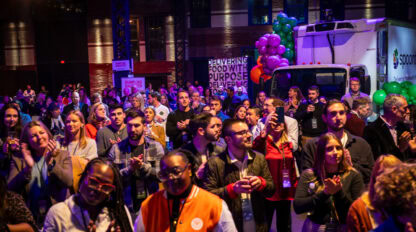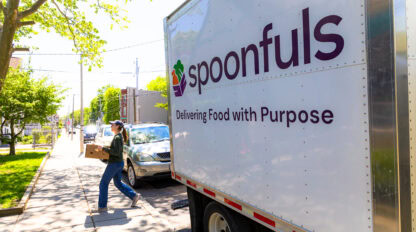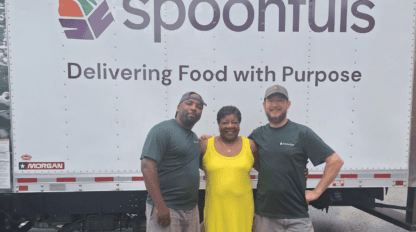The State of Hunger: Worcester County

Today, we’re kicking off our “State of Hunger” blog series, a look at how hunger impacts people in each of the regions in which Spoonfuls operates. We’re checking in with partner food programs and the staff and volunteer leaders who help to distribute Spoonfuls’ deliveries. And we’re learning from them what makes their communities so special.
Having recently celebrated the one-year anniversary of our launch in Worcester County, we’re starting here where, last year, Spoonfuls worked with 11 food retailers and 31 nonprofits to rescue and distribute 288,000 pounds of food – the equivalent of 230,000 meals! – for people facing food insecurity.
“The heart of Massachusetts”
“Worcester is known as the heart of Massachusetts,” says Hilda Maldonado, Program Director at Green Island Neighborhood Center, a Spoonfuls’ nonprofit partner based in the City of Worcester. “It’s a wonderful place to live. Not only for its history and surroundings. It’s also a growing city that offers countless opportunities and support for those in the community. But what really makes it unique is the people. With an abundance of diversity and culture, there is always something new to discover.”
Beyond the limits of Massachusetts’ second largest city, from its suburban downtowns to farmland, Worcester County is distinguished for its commitment to and pride in community.
Hunger in Worcester County
According to Feeding America, 65,000 people (7.7% of the population) in Worcester County faced food insecurity in 2021. While this is the most recent county-wide data available, it’s worth noting that Project Bread has tracked a steady increase in food insecurity across Massachusetts in 2022 and 2023. Our nonprofit partners have consistently told us they have more people turning to them for food, too, especially in light of the end of pandemic-era relief programs and still-high food and utility costs.
“Like other areas of the country, we’re seeing skyrocketing rent, food, and fuel prices. We have seen increased numbers of individuals become homeless and living in tents,” said Yolanda Talley, Coordinator of Yes We Care, also a Spoonfuls’ nonprofit partner based in Worcester. “Our hours of operation are 2 – 5 pm, and the line starts forming as early as 9 am. The needs are great and appear to be growing.”
Hilda agrees, citing the high cost of living. She says she sees the impact on families coming to the Green Island Neighborhood Center, too. “They’re having to make drastic decisions in order to meet their basic needs. I’ve seen people stop paying their electricity or water bill, for example, in order to put food on the table.”
And people living in cities aren’t the only ones affected.
April Caruso, Director of the Spencer Senior Center, cites a common misconception, “Some think that those living in the suburbs have plenty, but in reality, many people here are struggling daily to fulfill basic needs, too.”
Who experiences hunger in Worcester County
Anyone, of any demographic, can be impacted by food insecurity – but food insecurity doesn’t impact people equally. In Worcester County, as in other parts of the Commonwealth, it disproportionately impacts immigrants and people of color (Project Bread). And 71% of people facing food insecurity are living at 200% of the poverty line (Feeding America).
Hilda’s program, Green Island, serves primarily low-income families living in the Green Island section of Worcester, including immigrants and refugees from various South American countries and Hati, and people who are unhoused.
Tempe Staple, Senior Director of Research & Development at LIFT, another Spoonfuls’ nonprofit partner, tells us about her work in Worcester’s Main South. “Main Street, where LIFT is located, is in the neighborhood referred to as ‘Main South.’ It’s known by prostituted people as the ‘The Track,’ since they are forced to walk up and down waiting for buyers. This location not only brings a focus to areas of Worcester that can use more support for people experiencing prostitution and homelessness, but also to how development decisions will have a crucial impact on either supporting or displacing people who need assistance as the city grows. Currently, outreach staff carry out our mission in the Main South neighborhood, which is historically resided by Black, Latin/Hispanic, lower-income households, and college student renters.”
West of Worcester, in Spencer, April says she’s seeing an increase in the number of seniors facing food insecurity. “With the rising cost of food, heat, and other bills, there is more of a need for food.”
But the fact remains: Hunger can happen to anyone, with many people an emergency away from a visit to their local pantry. Says Hilda, “No one is exempt from losing their main source of income due to job loss, illness, or other reasons.”
Resiliency – during the pandemic and beyond
The reality of the problem (that it can happen to anyone and that it happened to so many people for the first time during the pandemic) inspired a concerted community response, with Spoonfuls’ partners continuing to serve more people than ever.
Yes We Care, which launched during the pandemic, is now serving over 300 families a week. LIFT also grew during the pandemic, never ceasing operations. The Spencer Senior Center’s lunches have tripled in size. And Green Island Neighborhood Center is serving increasing numbers of food insecure neighbors with a commitment to supporting everyone it can.
In the City of Worcester, too, the nonpartisan Taskforce on Food Insecurity was formed in March 2020 to bring together leaders and advocates in the food justice space to tackle root cause solutions alongside urgent response. The group recently kicked off a first-of-its-kind Worcester citywide community food assessment to gather current data about food access and food insecurity. Data will inform service providers’ work in the region and proposed policy solutions. Learn more.
Ways to support
Support Spoonfuls. A consistent challenge for many of our nonprofit partners in Worcester County and across the state has been ensuring that people have access to food that meets their dietary and cultural needs with pantry partners reporting that the kinds of foods we recover here at Spoonfuls (nonperishables like fruits and veggies, dairy products, and meats) are among the first to go. Consider a gift to support our work. Every dollar we receive enables us to recover nearly 2 lbs of fresh, wholesome food. You can give here.
Support our Worcester County nonprofit partners. Give or volunteer. All of our Worcester County based partners count on philanthropic support and many of the organizations we work with rely on volunteers to carry out their missions. Learn more about them and reach out directly to those nearest you to see whether they can use your help now. Check out our Worcester County nonprofit partners.
Help us spread the word. Share information about wasted food and food insecurity on your social media as one easy way. Doing so can inform people about resources in their community or motivate them to take action. It can also work to reduce the stigma that keeps people from seeking the support they need. Says April, that support is important. “When people go to food pantries, it can allow them to instead pay a bill or put gas in their car to get to work.”


